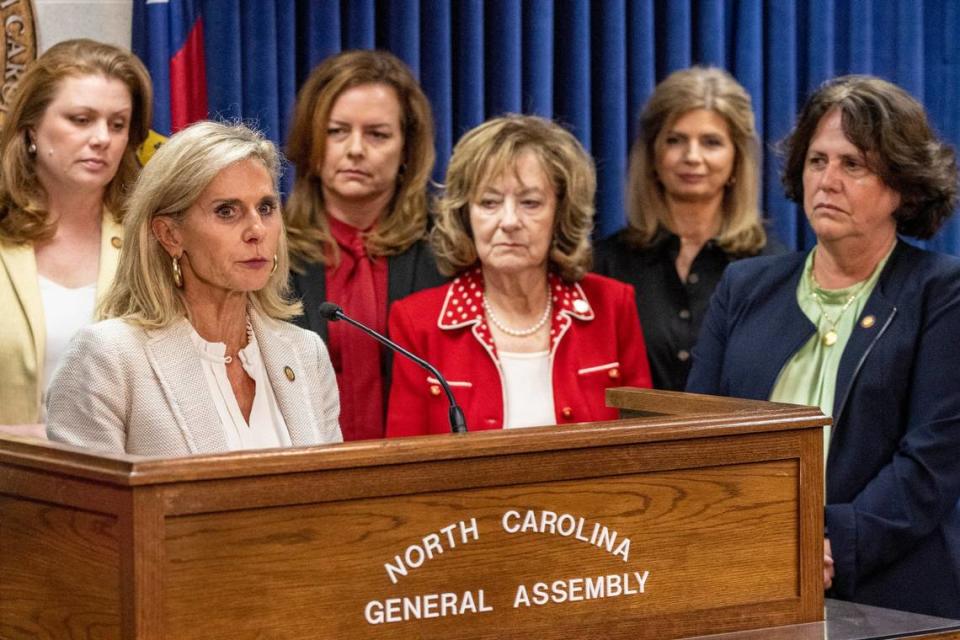‘This is a big deal. Not just for us.’ NC abortion law to limit access across the South
- Oops!Something went wrong.Please try again later.
The new 12-week abortion ban proposed by North Carolina lawmakers limits access to abortions for people across the South.
In the months after the fall of Roe v. Wade, which allowed women access to an abortion through 23 weeks of gestation, states across the nation began enacting new abortion restrictions.
North Carolina currently prohibits abortions after 20 weeks of pregnancy, with limited exceptions for medical emergencies — making it, comparatively to other Southern states, an abortion haven.
But under the new proposal unveiled by Republican lawmakers Tuesday, abortions would be banned after 12 weeks with exceptions for rape and incest, and in cases of fetal “life-limiting” anomalies and where the mother’s life is in danger. These new abortion regulations passed the House on Wednesday and are set to be voted on Thursday in the Senate.
Post-Roe, Alabama and Mississippi banned abortions at all stages of pregnancy. Georgia forbids the procedure around six weeks, with Florida set to follow suit.
After the Supreme Court’s reversal of Roe, the number of abortions provided in the North Carolina shot up by 37%. As a result, abortion clinics in the state have, at some points, had a four-week waiting list for appointments, as previously reported by The News & Observer.
With the new abortion law, people in North Carolina who need an abortion after 12 weeks and do not meet exceptions will face more limited options in neighboring states, which largely have tighter abortion regulations.
Meanwhile, some of those who traveled to North Carolina for abortions may need to seek alternatives.
“North Carolina became the one place where many women throughout the Southeast could come,” Democratic Sen. Val Applewhite said Tuesday.
“So this does not just affect North Carolina,” said Applewhite, of Cumberland County. “It affects surrounding states as well, as more restrictions are put in place. So this is a big deal. Not just for us.”
Here is a roundup of abortion laws in states neighboring North Carolina:
Alabama
Prohibits abortion at all stages of pregnancy, with limited exceptions when medically necessary to avoid serious health risks.
There are no exceptions for rape or incest.
Any illegal abortion performed is a Class A felony, not applicable to the pregnant person.
South Carolina
Prohibits abortions after 22 weeks, making it one of the South’s less restrictive states.
Limitations include parental consent requirements and a 24-hour waiting period prior to an abortion. There are exceptions for rape, incest and medical emergencies.
A person who performs an illegal abortion, including the pregnant person, can face charges.
South Carolina had a six-week ban that kicked in after Roe v. Wade was overturned. In January, the state’s Supreme Court struck down the law banning abortion as unconstitutional. The Republican-led legislature has tried and failed multiple times in recent months to pass new more restrictive abortion legislation, most recently aiming to ban abortions at six weeks.
Tennessee
Prohibits abortion at all stages of pregnancy, with limited medical emergency exceptions, including to prevent death or serious physical harm. There are no exceptions for rape or incest.
Anyone – not including the pregnant women – who attempts to perform or performs an abortion is subject to a felony charge, barring exceptions.
Georgia
Prohibits abortions after there is a “detectable human heartbeat,” which is roughly six weeks.
There are exceptions for life-threatening medical emergencies, not including emotional or mental conditions, as well as exceptions in the case of a rape or incest, up to 20 weeks.
Mississippi
Prohibits abortion at all stages of pregnancy, except to save the life of the pregnant person, or in cases of rape that have been reported to law enforcement.
Any illegal abortion performed by anyone, except the pregnant person, is punishable with one to 10 years of imprisonment.
Florida
Prohibits abortions after 15 weeks, with exceptions to save the pregnant person’s life, to avoid serious physical health risk and in cases of fatal fetal abnormalities. Pregnant people seeking an abortion must get an ultrasound, get counseling, have a mandatory 24-hour waiting period and, if a minor, get parental consent.
A person who performs an illegal abortion, including the pregnant person, faces a felony charge.
In April, Florida enacted a six-week ban, which would go into effect 30 days after the Florida Supreme Court rules on an existing challenge to the state’s existing 15-week ban. This six-week ban creates new exceptions for rape and incest up to 15 weeks. It does not change exemptions on the life and health of the pregnant person.


